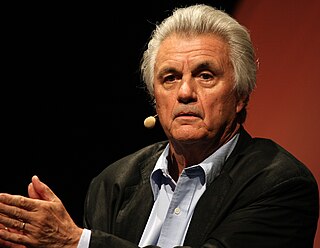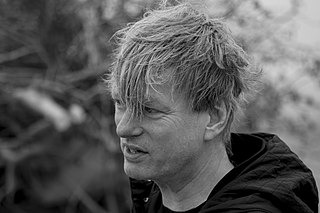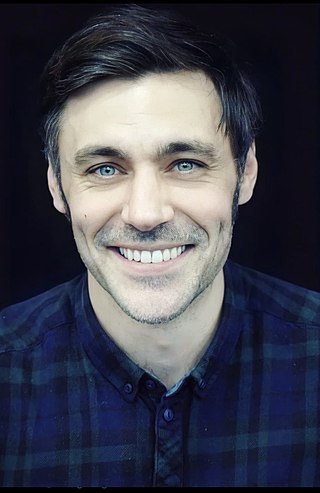
John Winslow Irving is an American-Canadian novelist, short story writer, and screenwriter.

Idi Amin Dada Oumee was a Ugandan military officer and politician who served as the third president of Uganda from 1971 to 1979. He ruled as a military dictator and is considered one of the most brutal despots in modern world history.

Robert Dennis Harris is a British novelist and former journalist. Although he began his career in journalism and non-fiction, he is best known for his works of historical fiction. Beginning with the best-seller Fatherland, Harris focused on events surrounding the Second World War, followed by works set in ancient Rome. His most recent works are varied in settings but are mostly set after 1870.

The Dark Tower is a series of eight novels, one novella, and a children's book written by American author Stephen King. Incorporating themes from multiple genres, including dark fantasy, science fantasy, horror, and Western, it describes a "gunslinger" and his quest toward a tower, the nature of which is both physical and metaphorical. The series, and its use of the Dark Tower, expands upon Stephen King's multiverse and in doing so, links together many of his other novels.

David Peace is an English writer. Best known for his UK-set novels Red Riding Quartet (1999–2002), GB84 (2004), The Damned Utd (2006), and Red or Dead (2013), Peace was named one of the Best of Young British Novelists by Granta in their 2003 list. His books often deal with themes of mental breakdown or derangement in the face of extreme circumstances. In an interview with David Mitchell, he stated: "I was drawn to writing about individuals and societies in moments that are often extreme, and often at times of defeat, be they personal or broader, or both. I believe that in such moments, during such times, in how we react and how we live, we learn who we truly are, for better or worse."

Kevin Glyn Buchanan Macdonald is a Scottish film director. His films include One Day in September (1999), a documentary about the 1972 murder of 11 Israeli athletes, which won him the Academy Award for Best Documentary Feature, the climbing documentary Touching the Void (2003), the drama The Last King of Scotland (2006), the political thriller State of Play (2009), the Bob Marley documentary Marley (2012), the post-apocalyptic drama How I Live Now (2013), the thriller Black Sea (2014), the Whitney Houston documentary Whitney (2018), and the legal drama film The Mauritanian (2021).

Michel Faber is a Dutch-born writer of English-language fiction, including his 2002 novel The Crimson Petal and the White, and Under the Skin (2000) which was adapted for film by Jonathan Glazer, starring Scarlett Johansson. His novel for young adults, D: A Tale of Two Worlds, was published in 2020. His book, Listen: On Music, Sound and Us, a non-fiction work about music, came out in October 2023.

John Douglas Wilson Carswell is a British former politician who served as a Member of Parliament from 2005 to 2017, co-founded Vote Leave and currently serves as president and CEO of the Mississippi Center for Public Policy.

Caryl Phillips is a Kittitian-British novelist, playwright and essayist. Best known for his novels, Phillips is often described as a Black Atlantic writer, since much of his fictional output is defined by its interest in, and searching exploration of, the experiences of peoples of the African diaspora in England, the Caribbean and the United States. As well as writing, Phillips has worked as an academic at numerous institutions including Amherst College, Barnard College, and Yale University, where he has held the position of Professor of English since 2005.
Moses Isegawa, also known as Sey Wava, is a Ugandan author. He has written novels set against the political turmoil of Uganda, which he left in 1990 for the Netherlands. His debut novel, Abyssinian Chronicles, was first published in Amsterdam in 1998, selling more than 100,000 copies and gaining him widespread national attention. It was also very well reviewed when published in English in the United Kingdom and United States, in 2001. Isegawa became a naturalized Dutch citizen, but he returned to live in Uganda in 2006.
Giles Foden is an English author, best known for his novel The Last King of Scotland (1998).

Ladysmith is Giles Foden’s second novel. It was published in 1999 by Faber and Faber.

The Last King of Scotland is a 2006 historical drama film directed by Kevin Macdonald from a screenplay by Peter Morgan and Jeremy Brock. Based on Giles Foden's 1998 novel, its plot depicts the dictatorship of Ugandan President Idi Amin through the perspective of Nicholas Garrigan, a fictional Scottish doctor. The film stars Forest Whitaker, James McAvoy, Kerry Washington, Simon McBurney, and Gillian Anderson. The title of the film refers to Amin's spurious claim of being the King of Scotland.
Edward Mendelson is a professor of English and Comparative Literature and the Lionel Trilling Professor in the Humanities at Columbia University. He is the literary executor of the Estate of W. H. Auden and the author or editor of several books about Auden's work, including Early Auden (1981) and Later Auden (1999). He is also the author of The Things That Matter: What Seven Classic Novels Have to Say About the Stages of Life (2006), about nineteenth- and twentieth-century novels, and Moral Agents: Eight Twentieth-Century American Writers (2015).

Uganda Broadcasting Corporation (UBC) is the public broadcaster network of Uganda. It was founded as a result of the "Uganda Broadcasting Corporation Act, 2004", which merged the operations of Uganda Television (UTV) and Radio Uganda. It started broadcasting on November 16, 2005.
Robert Astles, BEM was a British soldier and colonial officer who lived in Uganda and became an associate of presidents Milton Obote and Idi Amin.

James McAvoy is a Scottish actor. He made his acting debut as a teen in The Near Room (1995) and appeared mostly on television until 2003, when his film career began. His notable television work includes the thriller State of Play (2003), the science fiction miniseries Frank Herbert's Children of Dune (2003), and the drama series Shameless (2004–2005).

Liam Garrigan is an English actor. As a youth, he attended classes at Kingston upon Hull's Northern Theatre Company and was a student at Wyke College, Kingston upon Hull. His first television role was in 2003 as Nic Yorke in the BBC continuing drama series Holby City. He is best known for his roles as Ian Al-Harazi on the Fox series 24: Live Another Day (2014), as King Arthur in the ABC series Once Upon a Time (2015–2016), the film Transformers: The Last Knight (2017), and as Thomas Jopson on AMC's The Terror (2018). He also provides the voice for Captain Kurt in the role-playing game GreedFall.
John Wilson Carswell is a Scottish physician who was one of the first medical researchers to identify HIV/AIDS in Uganda.

Isaac Maliyamungu, also known as Isaac Lugonzo, was a Ugandan military officer who served as one of President Idi Amin's most important officials and supporters during the Ugandan military dictatorship of 1971–79. Born in the Congo, Maliyamungu was one of the members of the 1971 coup that brought Amin to power, and was thereafter responsible for brutally suppressing dissidents throughout the country. Rising through the ranks, Maliyamungu amassed great power and earned a feared reputation. He was responsible for the mass murder of civilians and soldiers suspected of being disloyal to Amin.















